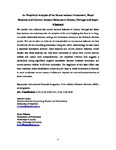An empirical analysis of the nexus between investment, fiscal balances and current account balances in Greece, Portugal and Spain
| dc.contributor.author | Litsios, Ioannis | |
| dc.contributor.author | Pilbeam, K | |
| dc.date.accessioned | 2019-01-30T18:50:39Z | |
| dc.date.available | 2019-01-30T18:50:39Z | |
| dc.date.issued | 2017-06 | |
| dc.identifier.issn | 0264-9993 | |
| dc.identifier.issn | 1873-6122 | |
| dc.identifier.other | C | |
| dc.identifier.uri | http://hdl.handle.net/10026.1/13256 | |
| dc.description.abstract |
We provide new evidence that current account balances in Greece, Portugal and Spain have become non-stationary after the adoption of the euro implying that there is no long-run stable relationship between savings and investment contrary to the Feldstein-Horioka puzzle. This can be taken as evidence of unsustainable current account balances and loss of solvency for the underlying economies. Using the ARDL methodology we also report a statistical association between fiscal balances and current account balances, which implies that fiscal austerity can help these economies to reduce their current account deficits and restore their competitiveness. Our empirical evidence also suggests a particularly strong significant negative association between domestic investment and current account deficits in all three economies. The magnitude of this latter effect may have important policy implications concerning the ways in which investment is financed in order to alleviate current account deficits and improve the external competitiveness of these economies. | |
| dc.format.extent | 143-152 | |
| dc.language | en | |
| dc.language.iso | en | |
| dc.publisher | Elsevier BV | |
| dc.subject | International financial integration | |
| dc.subject | Twin deficits | |
| dc.subject | Feldstein-Horioka | |
| dc.subject | ARDL | |
| dc.subject | Co-integration | |
| dc.title | An empirical analysis of the nexus between investment, fiscal balances and current account balances in Greece, Portugal and Spain | |
| dc.type | journal-article | |
| dc.type | Journal Article | |
| plymouth.author-url | https://www.webofscience.com/api/gateway?GWVersion=2&SrcApp=PARTNER_APP&SrcAuth=LinksAMR&KeyUT=WOS:000400222800011&DestLinkType=FullRecord&DestApp=ALL_WOS&UsrCustomerID=11bb513d99f797142bcfeffcc58ea008 | |
| plymouth.volume | 63 | |
| plymouth.publication-status | Published | |
| plymouth.journal | Economic Modelling | |
| dc.identifier.doi | 10.1016/j.econmod.2017.02.003 | |
| plymouth.organisational-group | /Plymouth | |
| plymouth.organisational-group | /Plymouth/Faculty of Arts, Humanities and Business | |
| plymouth.organisational-group | /Plymouth/REF 2021 Researchers by UoA | |
| plymouth.organisational-group | /Plymouth/REF 2021 Researchers by UoA/UoA17 Business and Management Studies | |
| dcterms.dateAccepted | 2017-02-05 | |
| dc.identifier.eissn | 1873-6122 | |
| dc.rights.embargoperiod | Not known | |
| rioxxterms.versionofrecord | 10.1016/j.econmod.2017.02.003 | |
| rioxxterms.licenseref.uri | http://www.rioxx.net/licenses/all-rights-reserved | |
| rioxxterms.licenseref.startdate | 2017-06 | |
| rioxxterms.type | Journal Article/Review |


